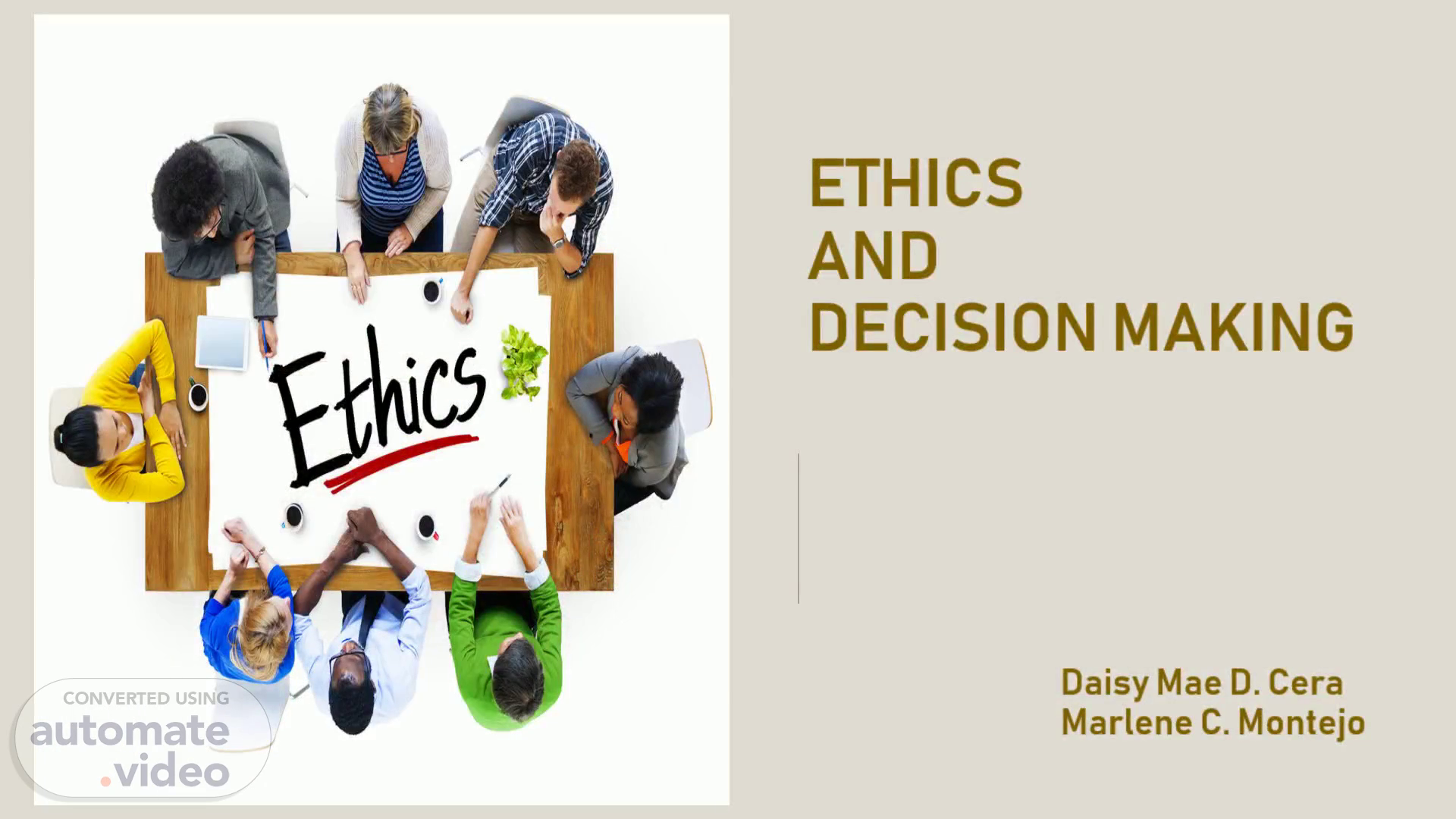
ETHICS AND DECISION MAKING
Scene 1 (0s)
ETHICS AND DECISION MAKING. Daisy Mae D. Cera Marlene C. Montejo.
Scene 2 (8s)
ETHICS. Provides a set of standards for behavior that helps us decide how we ought to act in a range of situations. It is all about making choices, and about providing reasons why we should make these choices. As its simplest, ethics is a system of moral principles that affect how people make decisions and lead their lives. It is concern with what is good for the individuals and society and is also described as moral philosophy. The term is derived from the Greek work ethos which can mean custom, habit, character or disposition. It is about choices which matter, and choices which matter are dilemmas. - Martin Cohen.
Scene 3 (38s)
ETHICAL DILEMMA. - Is a complex situation where ethical principles or values are in conflict. - Ethics covers the following dilemmas: How to live a good life Our rights and responsibilities The language of right and wrong Moral decisions – what is good and bad?.
Scene 4 (52s)
TRADITIONAL ARRANGEMENT OF ETHICS. META-ETHICS -Deals with the nature of the right or the good, as well as the nature and justification of ethical claims NORMATIVE ETHICS -Deals with the standards and principles used to determine whether something is right or good APPLIED ETHICS -Deals with the actual application of ethical principles to a particular situation..
Scene 5 (1m 10s)
[Audio] 1. Universalism – all people should uphold certain values such as honesty, that society needs to function. UPHOLDS VALUES Caux Principle – ethical principle established by the international executives based on Caux, Switzerland in collaboration with business leaders from Japan, Europe and USA. Two basic ethical ideas: Kyosei – means living and working together for the common goal, allowing cooperation and mutual prosperity to coexist with healthy and fair competition. Human dignity – concerns the value of each person as an end, not a means to fulfillment of other's purposes. 2. Egoism – an ethical system defining acceptable behavior as that which maximizes consequences for the individual. Doing the right way, "the focus of moral philosophy, is defined by egoism as "do the act that promotes the greatest good for oneself." MAXIMUM BENEFIT FOR AN INDIVIDUAL 3. Utilitarianism – an ethical system stating that the greatest good for the greatest number should be the overriding concern of decision makers. SEEKING GREATEST GOOD FOR ALL 3. Relativism – philosophy that bases ethical behavior on the opinions and behaviors of relevant other people. DEPENDS WITH OTHER PEOPLE 4. Virtue Ethics – classification of people based on the level of moral judgement. A perspective that goes beyond the conventional rules of society by suggesting that what is moral must also come from what a mature person with good "moral character" would deem right..
Scene 6 (3m 3s)
ETHICAL DECISION MAKING. - Is a cognitive process that considers various ethical principles, rules, and virtues or the maintenance of relationships to guide or judge individual or group decisions or intended actions. - Making ethical decisions takes moral awareness, moral judgement and moral character..
Scene 7 (3m 19s)
Identify the problem. Collect relevant information. Evaluate the information. Consider alternatives. Make a decision. Act or implement. Review the Action..
Scene 8 (3m 30s)
1. Identify the problem.. The decision maker must be able to determine: If there is a possible violation of an important ethical principle, societal law, or organizational standard or policy. If there are potential consequences that should be sought or avoided that emanate from an action being considered to resolve the problem..
Scene 9 (4m 9s)
2. Collect relevant information.. The decision maker should seek to gather as much information as possible about which rights are being forsakes and to what degree. A consequential focus would prompt the decision maker to attempt to measure the type, degree, and amount of harm being inflicted or that will be inflicted on others..
Scene 10 (4m 42s)
3. Evaluate the information.. Once the information has been collected, the decision maker must apply some type of standard or assessment criterion to evaluate the situation. The decision maker might use one of the predominant ethics theories – utilitarianism, rights or justice..
Scene 11 (5m 6s)
4. Consider alternatives.. The decision maker needs to generate a set of possible action alternatives, such as: Confronting another person’s actions, Seeking a higher authority, or Stepping in and changing the direction of what is happening..
Scene 12 (5m 20s)
5. Make a decision.. The decision maker should seek the action alternative that is supported by the evaluation criteria used in Step 3. A decision maker selects a course of action that is supported by all the ethics theories or other evaluation criteria used in the decision-making process..
Scene 13 (5m 46s)
6. Act or implement.. The decision maker, if truly seeking to resolve the problem being considered, must take action. Once the action alternatives have been identified in Step 4 and the optimal response is selected in Step 5, the action is taken into step 6..
Scene 14 (6m 13s)
7. Review the Action.. Once the action has been taken and the results are known, the decision maker should review the consequences of the action. If the optimal resolution to the problem is not achieved, the decision maker may need to modify the actions being taken or return to the beginning of the decision-making process..
Scene 15 (6m 38s)
https://www.brown.edu/academics/science-and-technology-studies/framework-making-ethical-decisions https://www.bbc.co.uk/ethics/introduction/intro_1.shtml https://www.slideshare.net/cokyfauzialfi/ethical-decision-making-process.